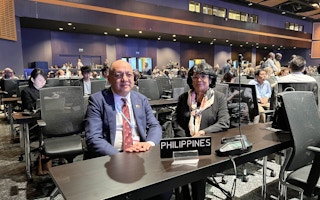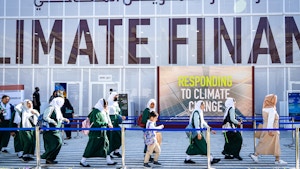Head of the Philippine delegation to the Conference of Parties (COP27), environment secretary Toni Yulo-Loyzaga, along with top officials, left Sharm el-Sheikh, Egypt early this week. As formal climate talks are entering final days, this has drawn strong criticism from Filipino civil society organisations.
“It was disappointing that the head of the Philippine delegation left without finishing the talks, at a time when negotiations are entering the second week and there are many outstanding issues still to be resolved,” said Lidy Nacpil, coordinator of Asian Peoples’ Movement on Debt and Development, a regional alliance of 50 member organisations and movements.
“Their departure may have the effect of weakening the effectiveness and efficiency of the Philippines delegation.”
According to Nacpil, Loyzaga and all commissioners of the Climate Change Commission, composed of officials that represent the Philippines at the annual conference, were asked to return to the Philippines to attend the ongoing budget hearings at the Philippine Senate.
Nacpil, a veteran civil society advocate, said she had hoped for better coordination in scheduling as she notes that the budget hearings are very important. “But so are the climate negotiations,” she said.
The office of the department of environment and natural resources did not respond to Eco-Business when asked to comment on Loyzaga’s early departure.
“
It was disappointing that the head of the Philippine delegation left without finishing the talks, at a time when the negotiations are entering the second week and there are many outstanding issues still to be resolved.
Lidy Nacpil, coordinator, Asian Peoples’ Movement on Debt and Development
Before Loyzaga left for Egypt, she had delivered a statement, describing how the Philippine delegation’s mandate at COP27 would be to “assert and safeguard the country’s interest in climate change negotiation.”
But the best person to do this is the head of delegation, said Aaron Pedrosa, secretary general of Sanlakas, a progressive coalition of different marginalised sectors in the Philippines.
Pedrosa said that to assert Philippines’ interests at COP, the head of delegation should be addressing the conference directly. “We have not seen this happening.”
“While we do have negotiators who are still at COP, the presence and leadership of the delegation at important moments, including at the opening ceremony and the ministerial meetings speak volumes. It conveys a strong message, that this is high priority for our government,” said Pedrosa.
The Philippine ambassador to Egypt Ezzedin Tago delivered the country position at the high-level ministerial dialogue on climate finance on Monday.
Environmentalists at COP27 are now concerned that almost all of the agenda items regarding climate finance remain unresolved.Delegates had begun to discuss the possibility the summit would go into overtime over the weekend.
One contentious issue is loss and damage, with small island states and developing countries pushing for the rich world to take responsibility for climate-fuelled impacts that they disproportionately suffer from but that they did not cause.
In the draft text of Article 6 of the Paris Agreement, issues like the funding arrangements with regards to loss and damage and long term climate finance remain in “brackets”, said Nacpil, who also represents the Green Climate Fund, a mechanism developed by the United Nations Framework Convention on Climate Change (UNFCCC) to provide assistance to poorer nations in adaptation and mitigation financially. The Fund is accreditated as an observer organisation at COP27.
Article 6, the last in the Paris rulebook requiring negotiation, will establish complex policy mechanisms for the establishment of carbon markets to provide financial incentives to encourage the world’s nations to voluntarily up their emissions-reduction ambitions.
Text or language that are placed in “brackets” are those that have been put forward by parties but have not yet been agreed on. It indicates that the parties will still have to choose which text will be developed for the final decision, added Nacpil.
Critical issues inserted by the Philippine delegation in the draft but that have yet to be finalised include requests for urgent adaptation finance for averting, minimising and addressing loss and damage, and the calls to establish a new collective quantified goal (NCQG) for climate finance prior to 2025. This new goal is to be built on the foundation of the US$100 billion per year by 2020 commitment and must consider the needs and priorities of developing countries.





















